25 – 26 April 2022
Delft, The Netherlands
Website: https://bit.ly/3IFfPXg
8th European Chemistry Congress (ECC8)
28 August – 1 September 2022
Lisbon, Portugal
Website: https://euchems2022.eu/
XIV Meeting of Young Chemical Engineers
24 – 25 February 2022
Zagreb, Croatia
Website: https://bit.ly/3DCdHw1
Young Chemists’ Meeting 2022
19 – 22 January 2022
Online
Website: https://bit.ly/3dFbxkE
EuChemS @ #GWB 2022
On the occasion of the Global Women’s Breakfast 2022 #GWB2022, an IUPAC initiative, the European Chemical Society (EuChemS) is pleased to invite you to join its own online breakfast on Wednesday 16 February 2021, from 10:00 to 11:30 CET.
Speakers from the European Chemistry community will address the necessity to have women in senior positions in STEM. The webinar will be chaired by Pilar Goya, EuChemS Vice-President and Chair of the EuChemS Task Group on Inclusion and Diversity – initiator of this breakfast.
We kindly invite you to register for the event ➡️ HERE
EIT Food Call for Proposals 2022
Find out more about it here.
Deadline: 14 January 2022
ERC Calls
Three European Research Council (ERC) calls for funding are open:
- Starting Grants
Deadline: 13 January 2022 - Public Engagement Award
Deadline: 3 February 2022 - Proof of Concept (ERC-2022-PoC2)
3 (three) deadlines: 15 February 2022, 19 May 2022, and 29 September 2022 - Consolidator Grants
Deadline: 17 March 2022
You are invited to take a look at them here.
MSCA Calls
Three Marie Skłodowska-Curie Actions (MSCA) calls for funding are open:
- MSCA Researchers at Risk 2021
Deadline: 6 January 2022 - MSCA Cofund 2021
Deadline: 10 February 2022 - MSCA Staff Exchanges 2021
Deadline: 9 March 2022
You are invited to take a look at them here.
EuChemS Division of Organic Chemistry Award for Service 2021
Submit your nomination HERE.
Deadline: 31 December 2021
EuChemS Female Organic Chemist of the Year 2021
Submit your nomination HERE.
Deadline: 31 December 2021
Members of the International Award Committee for European Chemistry Gold Medal (IACM)
Submit your nomination HERE.
Deadline: 31 December 2021
2021 EuChemS Historical Landmarks
Submit your nomination HERE.
Deadline: 31 December 2021
2021 EuChemS Award for Service
Submit your nomination HERE.
Deadline: 31 December 2021
2021 EuChemS Lecture Award
Submit your nomination HERE.
Deadline: 31 December 2021
European Food Safety Authority (EFSA) public consultations
A number of consultations put forward by the European Food Safety Authority (EFSA) are currently open.
- Assessment Report on the active substance Mecoprop-p
Deadline: 10 January 2022 - Assessment Report on the active substance Elemental Iron
Deadline: 17 January 2022 - Assessment Report on the active substance Fat distillation residues
Deadline: 5 February 2022
You can take a look at it all here.
EuChemS is an official accredited stakeholder of the European Food Safety Authority (EFSA).
European Chemicals Agency (ECHA) public consultations
A number of consultations put forward by the European Chemicals Agency (ECHA) are currently open.
- Hexyl salicylate (CLH proposal)
Deadline: 7 January 2022 - Magnesium metaborate (testing proposal)
Deadline: 10 January 2022 - Copper (CLP consultation)
Deadline: 28 January 2022
You can take a look at them here.
EuChemS is an official accredited stakeholder of the European Chemicals Agency (ECHA).
European Commission Public Consultations and Roadmaps
A number of consultations and roadmaps put forward by the European Commission are currently open:
- Microplastics pollution – measures to reduce its impact on the environment (call for evidence)
Deadline: 28 December 2021 - Waste shipments – revision of EU rules (public consultation)
Deadline: 17 January 2022 - Digitalising the energy sector – EU action plan (public consultation)
Deadline: 24 January 2022 - Chemicals – simplification and digitalisation of labelling requirements (public consultation)
Deadline: 16 February 2022
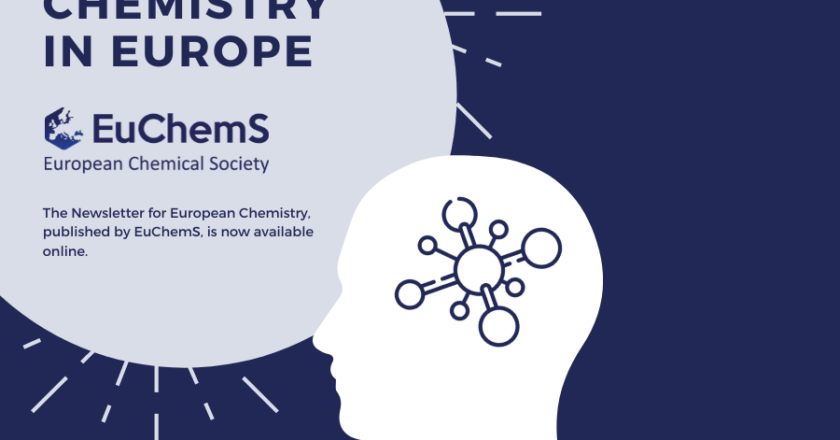
Discover the most recent issue of the ‘Chemistry in Europe’ newsletter!
Earlier this month, EuChemS released the fourth and last edition for the year 2021 of its newsletter Chemistry in Europe (CiE).
This issue includes the editorial from Ehud Keinan, IUPAC President-elect for the 2024-2025 biennium and former EuChemS Executive Board member, who discusses the challenges and opportunities to come for the International Union of Pure and Applied Chemistry.
We kindly invite you to discover other topics of this issue of the Chemistry in Europe newsletter here.
About Chemistry in Europe
Chemistry in Europe is a EuChemS quarterly publication. Its objective is to inform about research in Europe, to provide updates from EuChemS Member Organisations, and to look into policy-related developments.
If you wish to receive your quarterly update via email, subscribe here.
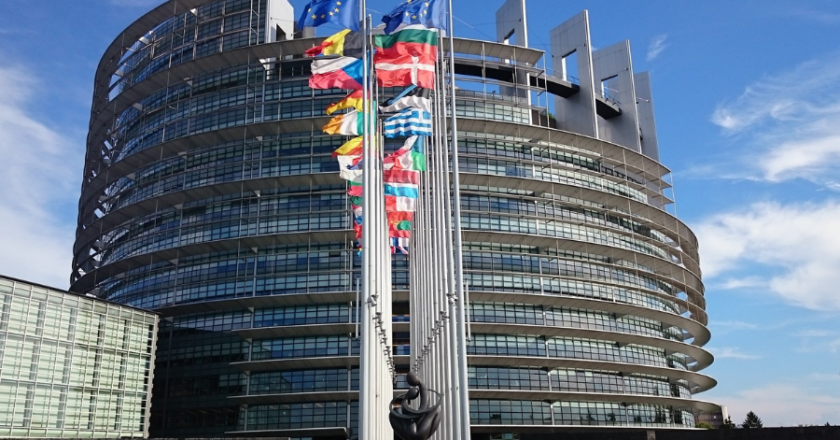
MEPs call the EU to secure its own Critical Raw Materials supply
Considering the ongoing digitalisation and transition to green energies in Europe, members of the European Parliament highlighted the European Union’s dependence on imports of resources and called for more recycling of Critical Raw Materials (CRMs), finding alternative solutions to them and domestic sourcing during a plenary session of the European Parliament Committee on Industry, Research and Energy (ITRE committee) held in Strasbourg on 24 November.
As rapporteur, MEP Hildegard Bentele successfully presented the European strategy for critical raw materials’ report.
Extremely glad about the huge majority of colleagues (543:52:94) who supported my strategic initiative report on #criticalrawmaterials. It shows that colleagues care about the fact that we need a resilient industrial base for the Green Deal and the twin transformation, … (1/3)
— Hildegard Bentele (@hildebentele) November 24, 2021
The increasing use of technologies led to a higher demand for CRMs. By highlighting the need to boost the EU’s strategic autonomy in CRMs, MEPs propose to work towards the EU resilience and securing strategic value chains for a green and digital Europe. MEPs’ recommendations include, amongst others, the diversification of CRMs sources, better funds for CRM projects under the National Recovery Plans and the Taxonomy Regulation, and stronger controls of EU exports of CRM waste products.
For more details, please read the ITRE Committee press release.
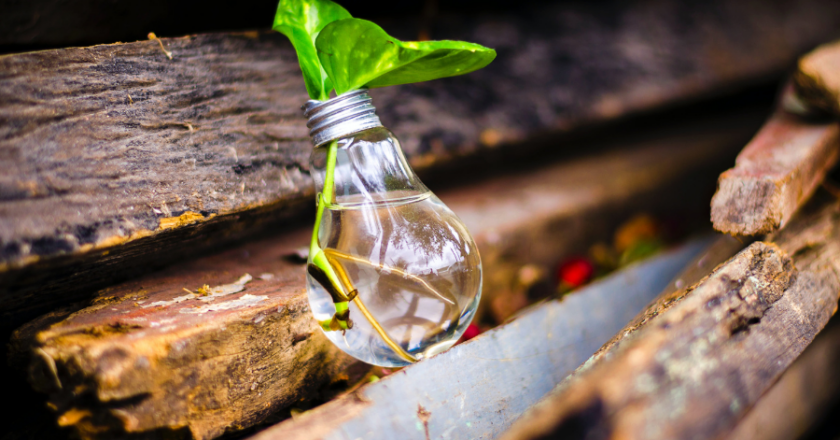
The EU Council adopted conclusions on the Pact for R&I and new ERA
On 26 November, the Council of the European Union adopted conclusions on the governance of the European Research Area (ERA) and a Pact for Research and Innovation (R&I) in Europe.
The ERA policy agenda for the 2022-2024 period establishes 20 priorities and a governance framework for the ERA. The actions listed in the ERA policy agenda include the promotion of attractive and sustainable research careers, bringing science closer to citizens, and improving EU-wide access to excellence. This document is conceived as a political guide for creating a single market for research in Europe.
EU research ministers also agreed on the Pact for R&I, one of the main tools in the implementation of the new ERA. Under the Pact, the EU member states commit to the following:
- a set of common EU principles and values for R&I;
- shared priority areas for action;
- investments and reforms;
- a simplified policy coordination and monitoring process.
As a reminder, the Pact is a long-term plan, with similar goals as the ones for ERA when it was implemented in 2000, but adapted to current challenges (e.g., the COVID-19 pandemic). You can read our full debrief on the Pact for R&I in the August issue of our BNU newsletter.
However, the Pact is a non-binding agreement: member states will implement it on a voluntary basis. These conclusions are the result of the deep reform of the ERA, which started in 2020.
For more details, please read the press release of the Council of the EU.
Following the adoption of the conclusions of the Council of the EU, the European Parliament Committee on Industry, Research and Energy, the ITRE committee, held a public hearing on the “New ERA for Research and Innovation” on 6 December. During this meeting, many topics were covered, including the prioritisation of investments and reforms in R&I towards the green and digital transition, supporting Europe’s recovery, increasing cooperation among member states, strengthening mobility of researchers, boosting market uptake of R&I results, and improving access to excellence for researchers across the EU.
#COMPET | Another successful day & great news for European science and innovation. 🎉@EUCouncil endorsed the Conclusions on the future of the European Research Area (#ERA), which allow for a more inclusive participation of @HorizonEU countries.
More 👇https://t.co/9G6P3SLhBF pic.twitter.com/u0Grh10prP
— EU2021SI (@EU2021SI) November 26, 2021
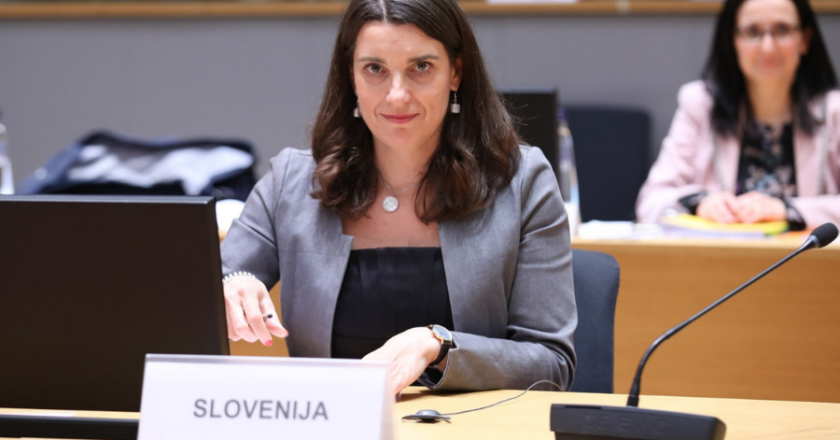
Slovenia about to conclude the term of its Presidency of the Council of the European Union: milestones reached for R&I in the EU
On 1 July 2021, Slovenia took over the Council of the EU’s Presidency from co-member state Portugal. During its 6-month term, the Slovenian Presidency has committed to fulfil the previously agreed on common priorities while narrowing their action down to specific guidelines in line with its motto “Together. Resilient. Europe”.
Slovenia is concluding its Presidency with the successful Ljubljana Declaration on Gender Equality in Research and Innovation: Simona Kustec, Slovenian Minister for Education, Science and Sport, presented the declaration at the Competitiveness Council meeting in Brussels on 26 November which was signed by 37 parties. This declaration aims to rectify imbalance in research and innovation by:
- ensuring fair, open, inclusive and gender equal career paths in research;
- evaluating intersectional perspectives on gender inequalities;
- facilitating mutual learning opportunities through form-follows-function robust governance;
- employing existing and newly developed tools, such as Gender Equality Plans, to facilitate systemic institutional change and remove institutional barriers;
- addressing and counteracting gender-based violence;
- supporting active monitoring and evaluation to ensure continuous improvement.
Signatories of this declaration commit to achieve these goals by 2025. It will be supported through joint actions of the European Research Area (ERA) – the conclusions on the governance for a renewed and more inclusive ERA were adopted by the Council in November, together with the Pact for Research and Innovation.
In addition, fostering EU private-public partnerships to maximise excellence in research outcomes remained an important item on Slovenia’s agenda. Slovenia completed negotiations on public-private (9) and public-public (1) partnerships under Horizon Europe. The European Parliament approved the €10 billion budget for these partnerships, which now entered into their set-up and implementation phase. They aim to drive European competitiveness in the sectors of healthcare, clean energy, and transport. These partnerships will be key in the realisation of the EU green and digital transition and to solving other important societal challenges.
The Council addressed climate related issues by welcoming the Fit for 55 package, an initiative expected to provide the EU with tools to meet the Green Deal’s objectives of reducing by 55% the EU’s greenhouse gas emission by 2030. Slovenian Minister of Environment and Spatial Planning, Andrej Vizjak, enhanced the debate by organising a meeting on this topic during the COP26 in Glasgow with EU ministers and representatives.
This Trio Presidency was also a leader in bringing together EU member state to join cancer research efforts by adopting the Principles of Successful Patient Involvement in Cancer Research.
Slovenia will pass the Presidency over to France on 1 January 2022 – opening member state of the next Trio Presidency, composed of Czechia and Sweden. We will write about the new Trio Presidency priorities related to R&I in the January 2022 issue of the BNU newsletter. In the meantime, you can find out more about the upcoming French Presidency here.
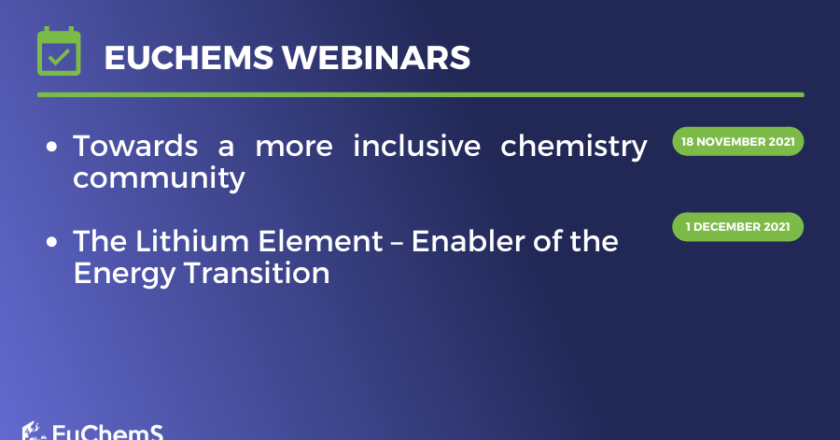
300+ attendees to the last 2021 EuChemS webinars
The past few weeks have been busy in terms of EuChemS webinars, we kindly invite you to read about them below.
Towards a more inclusive chemistry community
EuChemS organised the webinar ‘Towards a more inclusive chemistry community’ on 18 November 2021. Our invited speaker, Dr Alejandra Palermo, discussed some interventions that can make chemistry fairer and more inclusive for everyone. She also presented the strategies implemented by the Royal Society of Chemistry (RSC), a EuChemS Member Society, to increase the diversity of people choosing the chemical sciences.
The event was moderated by Pilar Goya, EuChemS Vice-President, who welcomed the attendees. They were invited to share their views during the Q&A session, which led to engaging debates. The EuChemS Task Group on Inclusion and Diversity is currently evaluating the outcomes of this webinar to propose follow up actions in the near future.
This webinar can be watched on the EuChemS YouTube channel.
The Lithium Element – Enabler of the Energy Transition
On 1 December 2021, EuChemS hosted a science policy workshop on the lithium element. An impressive line-up of speakers from the international scientific community and the European institutions addressed topics around the energy transition, including new European sustainability regulations, lithium batteries and their alternatives, geopolitical issues, and recycling. This online event also saw a wide range of scientific and EU policy discussions on the endangered elements and on the EuChemS Periodic Table. Interesting debates ensued during the panel discussions.
This workshop, chaired by Nicola Armaroli, gathered attendees from 22 different countries who were invited to ask questions, as well as answer polls related to the webinar discussions. Their feedback will be carefully considered by the EuChemS Task Group on the EuChemS Periodic Table, also chaired by Nicola Armaroli, for follow up actions. Welcome and closing words were given by Floris Rutjes, EuChemS President.
We invite you to watch the recordings of the Morning Session and Afternoon Session of this webinar on the EuChemS YouTube channel – and consider subscribing!
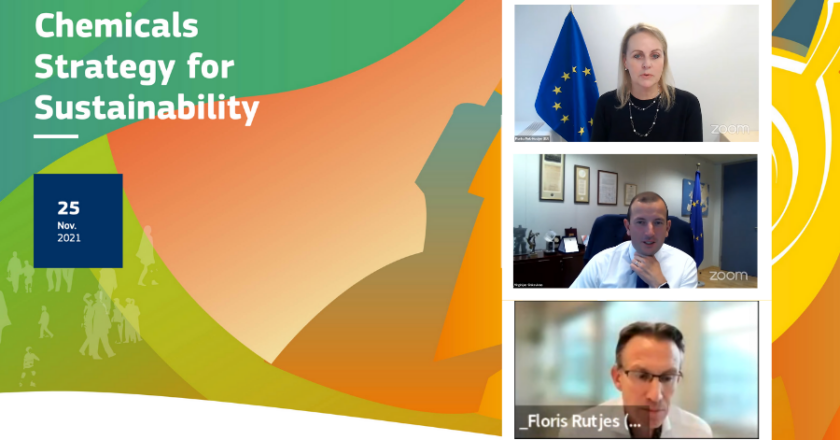
High Level Roundtable on the implementation of the Chemicals Strategy for Sustainability: EuChemS’ participation to its second meeting
The second meeting of the High Level Roundtable on the implementation of the Chemicals Strategy for Sustainability was held online on 25 November 2021. Floris Rutjes, EuChemS President, in his capacity as EuChemS’ representative within this expert group attended this meeting, together with Nineta Hrastelj, EuChemS Secretary General, as a Sherpa (substitute).
The topic of the meeting was enforcement aspect of the Chemicals Strategy for Sustainability.
Virginijus Sinkevičius, Commissioner for Environment, Oceans and Fisheries, chaired this meeting and provided information regarding the state of the implementation of the Chemicals Strategy for Sustainability. He also thanked all stakeholders, especially the Sherpas, for their work in preparing this meeting and contributing actively to the debate around the Strategy.
The recording of this meeting can be watched here.
The third meeting of the High Level Roundtable on the implementation of the Chemicals Strategy for Sustainability is scheduled to be held in-person in Brussels (Belgium) in May 2021.
As a reminder, the European Chemical Society, EuChemS, has been invited to the expert group “High Level Roundtable on the implementation of the Chemicals Strategy” set up by the DG Environment of the European Commission. EuChemS has set up an internal expert group to discuss topics regarding the implementation of the Chemicals Strategy and to propose a diversity of perspectives from EuChemS wide network to the European Commission.

